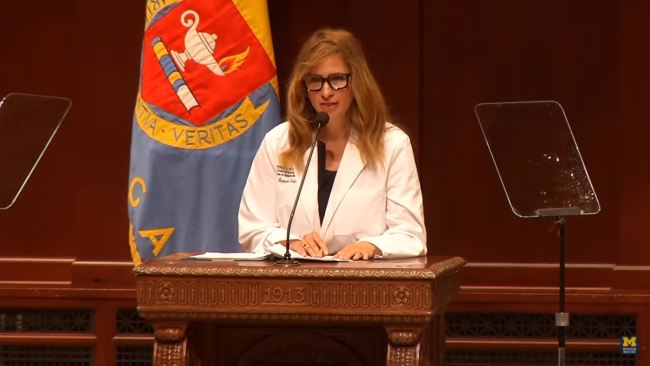You have /5 articles left.
Sign up for a free account or log in.

Dr. Kristin Collier delivers the keynote address during the University of Michigan Medical School’s white coat ceremony July 24.
Screenshot/Elizabeth Redden/Inside Higher Ed
With so many depressing news stories these days about an apparently unrelenting cancel culture in American higher education, it is important to take note of the occasional win. To wit: the University of Michigan Medical School just took a bold stand for academic freedom and speech.
Dr. Kristin Collier is an assistant professor of medicine at Michigan, where she directs the Program in Health, Spirituality and Religion. A productive and innovative scholar and popular instructor, Dr. Collier was selected by the medical school’s Gold Humanism Honor Society to give the keynote address at this year’s annual White Coat Ceremony on July 24 for incoming medical students. It was a feather in Dr. Collier’s cap bestowed by medical school honor society students through a democratic process of nomination and voting, and she was happy to accept.
Alas, it wasn’t long before the mob formed, demanding Dr. Collier’s cancellation for her pro-life views. Not even medical schools are immune from cancel culture these days. Importantly, since Dr. Collier had no plans to discuss abortion in her remarks, an online petition demanding an alternative speaker allegedly signed by more than 300 current and incoming medical students amounted to little more than an attempt to inflict exemplary punishment. (I write “allegedly” because the petition’s signatories are hidden from public view, thus providing no evidence of any signatures at all.)
It used to be that ideas were denied a platform by the cancellers; now it is more about punishing the person who has them whether they get expressed or not. As Dr. Collier remarked in an email to me, calls for her revocation felt like “targeted discrimination against who I am.”
No doubt, but it was also a warning to others who might be tempted to speak their own dissent. That is how totalitarianism works: everything is politicized, only one viewpoint is permitted and dissenters are silenced through intimidation tactics. Fear reigns.
Normally a story like this would end with some issuance of administrative doublespeak about the difficulty of balancing free speech concerns with the necessity of protecting the “vulnerable” from “harm”—and then the speech would be canceled. This time, however, the administrators went in a different direction.
In a July 13 statement, Dr. Marschall S. Runge, dean of Michigan Medical School, bravely reaffirmed Dr. Collier’s selection as speaker and highlighted “the critical importance of diversity of personal thought and ideas, which is foundational to academic freedom and excellence.” Dr. Runge added, “We would not revoke a speaker because they have different personal ideas than others.” Furthermore, his statement ended with a promised “forum on the importance of diversity of thought” to be held at the medical school, details of which Dr. Runge said would be announced soon.
The significance of this endorsement of academic freedom, diversity and collegiality cannot be overstated at Michigan, which for the past several years has bent over backward to placate small, howling crowds. While some of Michigan’s imbroglios have made national news—for example, last year’s public excoriation of world-renowned composer Bright Sheng, who was admonished by his own colleagues and dean after showing his class a 1965 film version of Othello featuring Laurence Olivier in the lead role with his skin darkened by makeup—most cancel cases at the university (and there are many) are handled quietly. Generally, the university’s approach has been to treat them as public relations problems.
The problem with the PR crisis-management approach is that it does not address what cancellation campaigns actually are: assaults upon the very foundations of the modern research university. If the academy brooks no dissent, how can knowledge advance? If differing opinions are treated as thought crimes, how much longer will thinkers want to work at our universities? If institutions of higher education do not protect free thought and speech, intellectual diversity, dissent—J. S. Mill’s heretics—why should they exist at all?
Perhaps Michigan’s medical school understands that better than most. In any case, by prioritizing “the importance of diversity of thought,” it has done something that few other Wolverine leaders have attempted of late: followed our existing policies. Section 1A of the University of Michigan Faculty Handbook states, “Expression of diverse points of view is of the highest importance, not only for those who espouse a cause or position and then defend it, but also for those who hear and pass judgment on that defense. The belief that an opinion is pernicious, false, or in any other way detestable cannot be grounds for its suppression.”
That policy clearly defends Dr. Collier, but it should have defended Sheng, too. The fact that it was applied in Dr. Collier’s case but not in Sheng’s says something about the qualitative leadership differences between the Medical School and School of Music, Theater, and Dance.
Although the university ultimately did not proceed with a formal investigation against Sheng or impose sanctions on him, Michigan’s treatment of him was deeply problematic because he was publicly shamed and treated like a pariah by colleagues. An important part of any academic’s career involves collegiality—socializing, dinner invitations, the development of a reputation—and that is what takes the biggest hit in situations like this. It was like the administration placed a “Kick Me” sign on his back, although they did not officially kick him.
As important as the quality of administrative leadership is, that is not the only takeaway from this story. There was a behind-the-scenes element to the Collier affair that should be noted: an email campaign undertaken by a few faculty members from across the university who reminded the deans that censorship and mob rule are generally undesirable. There were also emails sent by undergraduates from a pro-life student group who backed one of the very few publicly pro-life professors on campus. Small as they were, these email campaigns mattered. It was the strength of their reasoning, not their great numbers, that allowed administrators to overcome the online petition advocating punitive censorship.
Another, more basic takeaway from this victory is the importance of recommitting to Enlightenment principles of free thought and speech—yes, even among faculty. I am not the only professor who has been surprised to see some of my colleagues unable to defend—or, for that matter, cogently attack—principles of academic freedom and speech on their merits. One gets the weird impression that these are simply not issues that have been given much consideration by our colleagues, especially younger ones.
Seems like the time for that is now. Institutions of higher education should revisit foundational texts on free thought and speech by leading figures like Milton and Mill—not to mention the policies in our dusty old Faculty Handbooks—in what could become a permanent “forum on the importance of diversity of thought.” Why not start every academic year with a week devoted to these issues? It would certainly lead to fewer cancel controversies and also attack the documented and growing problem of student self-censorship.
A final takeaway from this story is the importance of courage. Dr. Runge and his associate deans, and of course Dr. Collier herself, distinguished themselves by taking their stand against the intolerant mob. Contrast their courage to that of “Abigail” and “Beth,” two incoming medical students who gave interviews to the Michigan Daily student newspaper criticizing Dr. Collier’s selection on condition that they could hide behind pseudonyms. If cancel culture is going to be turned back, it will require courage. Fortunately, in this case there was more of it on our side than theirs.
The July 24 white coat ceremony went well, all things considered. Dr. Steven Gay, an interim associate dean, made introductory remarks that featured a strong endorsement of learning from those who disagree with you, and Dr. Collier’s compelling address was delivered without interruption. While some medical students walked out, attracting national media attention, the majority stayed.
You would not know that if you relied on legacy media coverage of the ceremony that rolled out almost immediately. Media outlets focused on the walkout to underscore their usual sky-is-falling narrative while relying exclusively on a single, short, jittery video posted on Twitter that was inconclusive at best. The fact is, most students did not walk out of Dr. Collier’s remarks but stayed to listen. The mob did not succeed in canceling the professor. This was a big win for liberalism, not a loss. So let us savor this victory against censorship and repression, and may it mark a turning point at the University of Michigan and beyond. The health of higher education depends on it.








